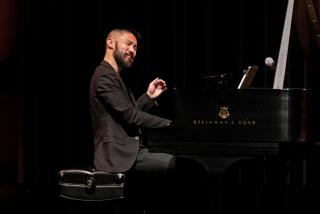Music Reviews : Benjamin Frith in West Coast Debut
One of the strongest arguments against international piano competitions as a main path to recognition is that the wrong pianists sometimes win, and the more virtuous go unrewarded.
That perspective is defensible. On the other hand, however, sometimes the best musicians triumph against lesser talents. Sometimes the judges make the right decision.
The decision at the 1989 Artur Rubinstein Competition in Tel Aviv was to award two first prizes, both to English pianists, the 31-year-old Benjamin Frith and the 19-year-old Ian Fountain.
Fountain made his U.S. debut at Ambassador Auditorium last year. Wednesday night, Frith played on the West Coast for the first time, also at Ambassador.
What made the judges in Israel waffle? Not having heard Fountain--reviewed in these pages by Donna Perlmutter 14 months ago--one can only wonder. But there were clues in Frith’s splendid but inconclusive recital in the Pasadena hall this week.
His self-effacing, oddball stage presence may create an aura of less confidence and fewer pianistic resources than the highly accomplished musician actually commands. And his address at the keyboard--hunched over, key-caressing and lost in thought--though it may thrill some, may also give a negative impression.
His playing is sure-fingered, his musical thoughts often clearly stated, and on Wednesday he seemed to have many ideas about the music--by Mozart, Schumann, Liszt and Chopin--at hand.
Best was Frith’s thorough probing of the kaleidoscopic character-pieces in Schumann’s “Davidbundlertanze” suite.
Here was imaginative and colorful phrasing, strong contrasts, deft tempo-relationships, a sense of scenario, and a whole arsenal of pertinent details. Not to mention very touching evocations of the quiet movements.
The same virtues should have materialized in the pianist’s generally straightforward but unconvincing reading of the Liszt Sonata. But they didn’t.
The work, as it can and often does, emerged choppy in continuity, unintegrated in thought. In many passages, speed alone seemed to be the point; even when it was achieved without loss of clarity--not invariably--musical sense seemed lost. One began to wonder if Liszt really has a place in Frith’s future.
From the evidence of the first encore, Chopin’s Nocturne in E minor, Opus 72, No. 1, the Polish composer does have such a place. As with his Schumann, Frith’s Chopin displayed great knowledge of style, a wonderful sense of communication and all the musical means to implement both.
More to Read
The biggest entertainment stories
Get our big stories about Hollywood, film, television, music, arts, culture and more right in your inbox as soon as they publish.
You may occasionally receive promotional content from the Los Angeles Times.










